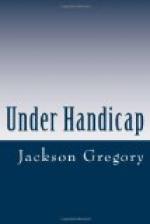Suddenly she jerked in her horse and sat waiting for him. And Conniston, grown stubbornly determined that if she wanted him she must call to him, stopped his own horse at a respectful distance behind her. She turned her head and looked at him wonderingly.
“What is it, Mr. Conniston? What makes you act so strangely? Don’t you want to ride with me?”
He touched his hat with mock solemnity.
“I did not know that you wanted me to. I imagined that the hired man’s place—”
“Oh, nonsense!” she broke in, impatiently. And with a swift smile which was so faint, so elusive that it was gone before he could be sure that he had not imagined it, “I thought that you were going—that we were going to be friends.”
“That was ages ago,” he retorted, bitterly. “Ages before I turned into a dollar-a-day laborer. Before I went to work for your father, Miss Crawford.”
“And that is nonsense. A man does a man’s work, honorable work with his two hands, and makes his own money, much or little. The most independent men in the world, Mr. Conniston, are men like Brayley and Toothy and Rawhide Jones and the rest. Are you not as good a man as these, as independent, as free to do as you like, as they are?”
“Am I as good a man!” He laughed shortly. “Conceit, no doubt, Miss Crawford, but none the less I really do fancy that a Conniston is as good as the sort of men I have been herding with here of late!”
She seemed not to notice his sarcasm, although his tones rang with it.
“Your going to work for father—I think it was brave of you. If it makes any difference at all it will be because you make it do so. I should be glad to have you ride with me as a companion if you wish.”
She pricked her horse with her spur and rode on. And Conniston, after a brief moment of hesitation in which he began to see that he had been acting rather foolishly, galloped up to her side.
“I am afraid I have been boorish, Miss Crawford. You must forgive me.”
“In three weeks you have learned a great deal, but there is still a great deal which you do not seem to have assimilated.”
“I have learned—” There was a question in his unfinished sentence.
“You have learned to ride as a man must who is to do his day’s work of twelve, maybe fifteen, hours in the saddle. Surely that is something. You have learned to rope a steer on the dead run. You have learned to rope your own horse, to throw him while you saddle him, and to ride him when he gets up. You have learned to work.”
He stared at her in surprise.
“How do you know what I have been doing?”
She laughed, a happy gurgle of a laugh which made a man want to laugh with her without knowing the cause of her merriment.
“Lonesome Pete has brought me news, and Toothy, and even your friend Brayley! Do you know,” mischief lurking in the depths of her eyes above the assumed gravity of her face, “I think that the boys are actually beginning to approve of you.”




